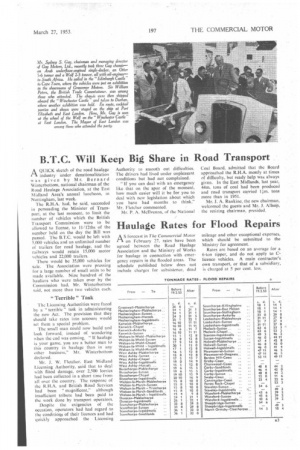B.T.C. Will Keep Big Share in Road Transport A QUICK sketch
Page 37

If you've noticed an error in this article please click here to report it so we can fix it.
of the road haulage industry Under denationalization was given by Mr. Bernard Winterhottorn, national chairman of the Road Haulage Association, at the East Midland Area's annual luncheon, in Nottingham, last week.
The R.H.A. had, he said, succeeded in persuading the Minister of Transport, at the last moment, to limit the number of vehicles which the British Transport Commission were to be allowed to license, to II /nibs of the number held on the day the Bill was passed. The B.'1'.C. would be left with 5,000 vehicles and an unlimited number of trailers for road haulage, and the railways would retain 15,000 motor vehicles and 22,000 trailers.
There would be 35,000 vehicles for sale. The Association were pressing for a large number of small units to be made available. Nine hundred of the hauliers who were taken over by the Commission had, Mr. Winterbottom said, not more than two vehicles each.
" Terrible " Task
The Licensing Authorities were faced by a " terrible " task in administering the new Act. The provision that they should take rates into account would set them a special problem.
The small man could now build and look forward, instead of wondering when the end was coming. " If haulage is your game, you arc a better man to this country in haulage than in any other business," Mr. Winterbottom declared.
Mr. J. W. Fletcher, East Midland Licensing Authority, said that to deal with flood damage, over 2,500 lorries had been collected in a short time from all over the country. The response of the R.H.A. and British Road Services had been "magnificent." although insufficient tribute had been paid to the work done by transport operators.
Despite the exigencies of the occasion, operators had had regard to the conditions of their licences and had quickly approached the Licensing Authority to smooth out difficulties. The drivers had lived under unpleasant conditions but had not complained..
"If you can deal with an emergency like that on the spur of the moment, how much easier will it be for you to deal with new legislation about which you have had months to think," Mr. Fletcher commented.
Mr. P. A. Mellvenna, of the National Coal Board, admitted that the Board approached the R.H.A. mostly at times of difficulty, but ready help was always given. In the East Midlands, last year, 44m. tons of coal had been produced and road transport carried 1.1m. tons more than in 1951.
Mr. J. A. Rankine, the new chairman, welcomed the guests and Mr. J. Allsop, the retiring chairman, presided.




















































































